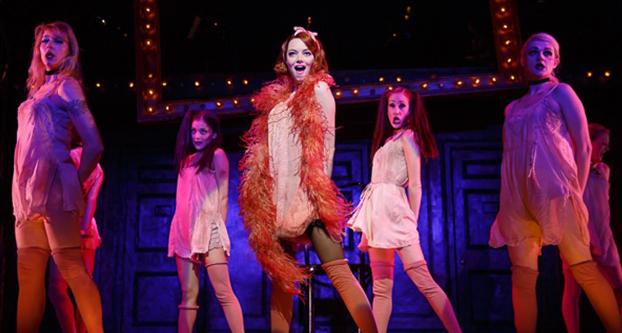
Fresno State University Theatre’s production of the Tony Award-winning musical “Cabaret,” brings a complex storyline with overtones of violence, drugs and love with an underlying of betrayal and the Nazi movement.
“Cabaret” is set in Berlin, Germany, right before the start of World War II where the audience sees the story unfold in the nightlife at the Kit Kat Klub. The plot revolves around a relationship regarding a young American novelist, Cliff Bradshaw and a cabaret performer Sally Bowles.
The underlying plot involves a German widow who owns a boarding house and her affair with a man named Herr Shultz, a German-born Jewish fruit vendor.
The emcee or Master of Ceremonies at the Kit Kat Klub serves as a bridge between the illusion of happiness the Klub puts on at the beginning of the story and the bitter revelation that all is not well at the Klub at the end.
“Cabaret” is a symbol of dichotomy, where the tales of lovers are broken apart because of their nationalities; lines are crossed and erased where the rules of sexuality are concerned in modern America, as they do not apply to the lawless conformities of the bedroom in “Cabaret.” Men dress as women and vice versa, portraying scenes of a genderless society, a society where everything and everyone is seemingly accepted in the beginning.
One of the more complex dichotomy questions is what a German-born Jew, Herr Shultz, is supposed to do when the Nazi party takes over. The whole first half of the musical, save for the scene before intermission reveals a light and upbeat mood. This directly contrasts with the mood of the second half where the last scene before intermission, reveals to the audience that the Kit Kat Klub supports the Nazi movement””a revelation that halted the audience’s laughter leaving the theater in complete silence. Soon, the audience was immersed into a world of dark secrets in the second half.
There were great performances all around, but the two performances that stood out the most were of Matthew Schiltz (the emcee), who had the uncanny ability to change the audience’s reaction any way the production’s material demanded it.
He traversed complicated subjects and provided much needed comic relief even in the most serious scenes. The other excellent performance came in the form of Aubrianne Scott (Sally Bowles) who believably allowed the audience to feel the pressures her character was put under.
One of the perfect examples of this was when Sally was put in the predicament of whether or not to have a child with Cliff and escape to America or to stay in her homeland of Berlin””the city that has welcomed her with open arms since she was young. If she stayed, Sally would have to have an abortion and return to the Kit Kat Klub stage without Cliff. After choosing the latter, the audience understands exactly why Sally decided to stay, a credit to her character arc along with Scott’s acting talents.
The story concludes with all the cabaret workers, previously turning their back to the huge Nazi flag that hangs from the roof, slowly turning around and singing the Nazi marching song, while the emcee takes off his newly-donned trench coat revealing a prisoner’s uniform, serving as a metaphor for the feelings of both the cabaret and Germany as a whole.
“Cabaret” has five performances left, the last being Saturday, Dec. 13. The musical takes place at the John Wright Theatre on campus.
For more information, visit www.fresnostate.edu/artshum/theatrearts/performances.




